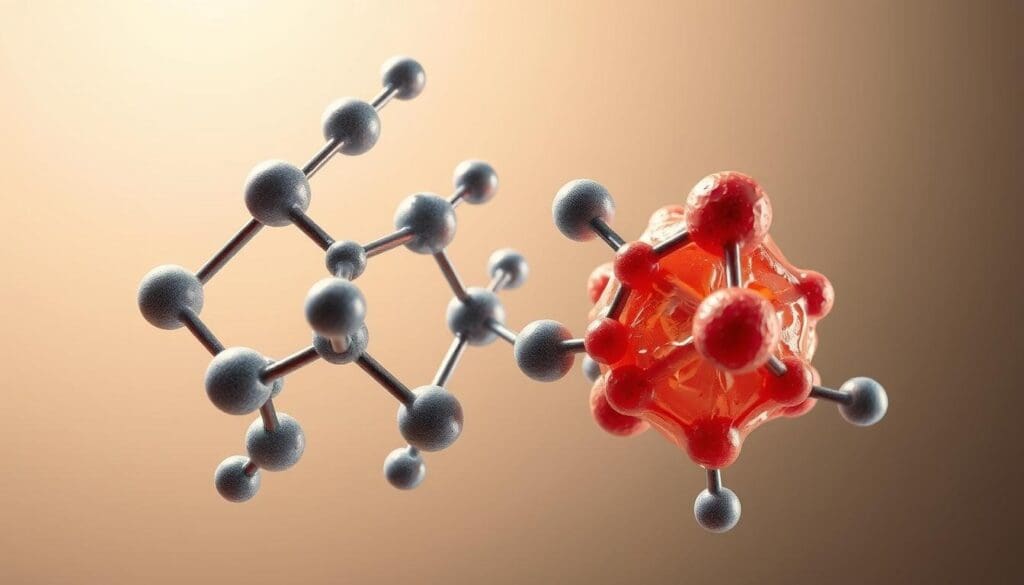Last Updated on November 17, 2025 by Ugurkan Demir

Knowing the difference between folate and vitamin B12 is key to staying healthy. At Liv Hospital, we understand how important it is to know what each vitamin does. We help prevent megaloblastic anemia and other health problems.
Folate and vitamin B12 are both important, but they do different things and cause different symptoms if you don’t have enough. We focus on giving you care that’s centered on you and based on solid evidence. This helps you understand the complex world of these vitamins.

B vitamins are key to how our bodies use nutrients to stay healthy. There are eight different B vitamins. They help with energy, nerve function, and heart health.
The B vitamin family includes thiamine (B1), riboflavin (B2), niacin (B3), pantothenic acid (B5), vitamin B6, biotin, folate (B9), and vitamin B12. Each vitamin has its own job, but they work together too.
B vitamins are important for:
B vitamins depend on each other for their functions. For example, folate (B9) and vitamin B12 work together in DNA repair. A lack of one can affect the other.
The synergy between B vitamins is most seen in energy production. They help turn food into energy for the body. This is key for healthy cells and organs.
| B Vitamin | Primary Role | Food Sources |
| B1 (Thiamine) | Energy production | Whole grains, legumes, nuts |
| B9 (Folate) | DNA synthesis, cell division | Leafy greens, legumes, citrus fruits |
| B12 (Cobalamin) | Nervous system function, red blood cell formation | Meat, fish, poultry, dairy products |
B vitamins are vital for our health. They have many roles and work together. A balanced diet with foods rich in these vitamins is essential.

Folic acid, also known as folate, is a key nutrient for our bodies. It helps with DNA repair and making amino acids. It’s also important for cell growth and metabolism.
Folic acid is the man-made version of folate, found in supplements and fortified foods. Folate is the natural kind in foods. Both are vital to avoid folate deficiency anaemia, which causes tiredness and brain issues.
“Folate plays a critical role in preventing birth defects of the baby’s brain or spine.” –
Centers for Disease Control and Prevention
Folate is found in many foods, helping us get enough through diet. Some top sources are:
In the UK, foods are often fortified with folic acid. This shows how important folate uk guidelines are for our health.
The amount of folate we need changes with age, sex, and if we’re pregnant. Adults usually need about 400 micrograms (mcg) of folate daily. Pregnant women need more, up to 800 mcg, to help their baby grow.
| Life Stage | Recommended Daily Folate Intake (mcg DFE) |
| Infants 0-6 months | 65 |
| Infants 7-12 months | 80 |
| Children 1-3 years | 150 |
| Children 4-8 years | 200 |
| Adults | 400 |
| Pregnant Women | 600-800 |
Folic acid and vitamin B12 are both B vitamins but different. The question is folate the same as b12 is common. But, folate is key for avoiding anaemia and supporting pregnancy.
Vitamin B12, also known as cobalamin, is vital for making red blood cells and keeping the nervous system healthy. It’s very important because not having enough can cause serious health problems.
Cobalamin is a complex compound with a cobalt ion at its center. It helps make DNA, fatty acids, and amino acids. Vitamin B12 is special because it’s made by bacteria, found in animal guts. So, animal products are the main sources of B12.
Animal products like meat, fish, poultry, eggs, and dairy are full of B12. Some fortified foods, like breakfast cereals and plant-based milk, are good too. People on a plant-based diet need fortified foods or supplements to get enough B12.
Getting vitamin B12 into the body is complex. It can be harder with age, certain health issues, and less intrinsic factor. Intrinsic factor is a stomach protein needed for B12 absorption. As we get older, our B12 absorption gets worse, which can lead to deficiencies.
To spot a B12 deficiency, doctors look for signs like tiredness, weakness, and nerve problems. Blood tests can check B12 levels. If someone has low B12, supplements or changing their diet can help.
Folic acid and B12 are both important nutrients, but they are not the same. They help make red blood cells and keep our nervous system healthy. Yet, they have different structures and roles in our bodies.
Folic acid, or vitamin B9, and vitamin B12 have different chemical makeup. Folic acid is a man-made version of folate found in foods. B12, or cobalamin, is a complex compound with a cobalt ion at its center. This difference affects how our bodies absorb and use them.
Both folic acid and B12 are key for making DNA and red blood cells. Not having enough of either can cause anemia. But, B12 is special for making myelin, the fatty stuff around nerve fibers. Folic acid is vital for preventing birth defects of the brain and spine, a role B12 doesn’t have.
People often mix up folic acid and B12 because they both help with similar things like fatigue and anemia. They are both B vitamins, which makes it seem like they’re the same. But, they’re not.
| Characteristics | Folic Acid (B9) | Vitamin B12 |
| Chemical Structure | Synthetic form of folate | Complex organometallic compound (cobalamin) |
| Primary Functions | DNA synthesis, red blood cell production, prevention of neural tube defects | DNA synthesis, red blood cell production, myelin synthesis |
| Deficiency Symptoms | Anemia, fatigue, neurological issues | Anemia, fatigue, neurological issues, nerve damage |
Folic acid, or vitamin B9, is key for many body functions. Not having enough can cause serious health problems. We’ll look at why people might not get enough folic acid and how to avoid these issues.
Not eating enough foods with folate is a big reason for deficiency. Folate is in leafy greens, legumes, and some fruits. But, it can be lost when cooking, like when boiling or overcooking. People who don’t eat these foods often are at higher risk. Eating more fresh, folate-rich foods can help avoid deficiency.
A study in a medical journal found that eating a lot of folate can lower the risk of deficiency. This is true for people at high risk, like pregnant women.
“Folate intake is key during fast growth times, like pregnancy and infancy.”
Some health problems can make it hard for the body to absorb folate. Conditions like celiac disease, Crohn’s disease, and ulcerative colitis can do this. Some medicines can also block folate absorption.
| Condition | Effect on Folate Absorption |
| Celiac Disease | Damages the small intestine, reducing folate absorption |
| Crohn’s Disease | Inflames the digestive tract, impairing nutrient absorption |
| Ulcerative Colitis | Causes inflammation and ulcers in the colon, affecting folate uptake |
Some life stages and conditions mean the body needs more folate. Pregnancy is one, because the fetus grows fast. Not getting enough folate can cause serious problems, like neural tube defects.
Other times when folate needs go up include infancy and adolescence. Some medical conditions, like hemolytic anemia, also raise the need for folate.
We need to know these times and adjust our diet or use supplements to prevent folate deficiency.
We look into vitamin B12 deficiency, its causes, and who’s most at risk. Vitamin B12 is key for making red blood cells, keeping nerves healthy, and making DNA. Not having enough can cause serious health issues. It’s important to know why it happens and who’s most likely to face it.
What we eat affects our vitamin B12 levels. Vegans are at higher risk because B12 is mainly in animal products. While some plant foods are fortified, vegans might not get enough. Older adults might also not eat enough due to less appetite or trouble with balanced diets.
How well our body absorbs vitamin B12 is also key. Our stomach needs intrinsic factor to absorb B12. Pernicious anemia, where the immune system attacks the stomach, makes this hard. Other stomach or small intestine problems can also block B12 absorption.
Getting older increases the risk of vitamin B12 deficiency. Our stomach’s ability to absorb B12 drops with age. Older adults are also more likely to have gut problems. So, it’s vital to check B12 levels in seniors and consider supplements if needed.
Folate and vitamin B12 deficiencies can have similar symptoms, making it hard to tell them apart. Knowing the differences is key to treating these health issues.
Both deficiencies affect red blood cell production and DNA synthesis. They share symptoms like:
These symptoms happen because both nutrients are vital for making healthy red blood cells. Without enough, you might get megaloblastic anemia, with big, abnormal red blood cells.
Vitamin B12 deficiency has its own set of symptoms. These include:
These symptoms affect the nervous system. A lack of vitamin B12 can damage the fatty covering around nerves, disrupting signals.
Folate deficiency also has its own signs, but they’re different from B12’s. Pregnant women are at risk for:
Folate is essential for fetal development. A deficiency can lead to serious problems.
| Symptom | Folate Deficiency | Vitamin B12 Deficiency |
| Fatigue/Weakness | Yes | Yes |
| Anemia | Yes (Megaloblastic) | Yes (Megaloblastic) |
| Neurological Symptoms | No | Yes |
| Pregnancy Complications | Yes | No (but can occur due to related factors) |
It’s important to know the differences between folate and vitamin B12 deficiency. While they share some symptoms, each has unique signs that need attention.
Too much folate can hide the signs of vitamin B12 deficiency. This is a big worry because it can cause a delay in finding and treating B12 deficiency. This delay can lead to serious damage to the nervous system.
Folate and vitamin B12 work together in our bodies. They are key for making DNA and breaking down fats and proteins. The way they work together is through the methionine cycle. Vitamin B12 helps turn folate into its active form, which is needed for DNA.
When folate levels are high, it can skip some steps in this process. This can hide the signs of B12 deficiency.
The effects of this masking are serious. If folate hides the signs of B12 deficiency, patients might not get treated on time. This is very dangerous because not treating B12 deficiency can cause permanent damage to the nervous system.
This damage can include nerve problems and memory loss. It’s also important to note that B12 deficiency can cause neurological symptoms even without anemia. So, doctors need to find other ways to diagnose B12 deficiency.
It’s very important to diagnose B12 deficiency correctly to avoid long-term damage. Doctors need to watch out for folate masking B12 deficiency. They should test for B12 levels, mainly in people at risk like the elderly, vegans, and pregnant women.
Testing should include direct B12 level checks and possibly other markers like methylmalonic acid (MMA). This way, doctors can accurately find B12 deficiency.
We stress the need for a detailed diagnostic approach to spot B12 deficiency, even with high folate levels. By grasping the complex relationship between folate and B12, doctors can manage patients better. This ensures they get the right treatment on time.
Healthcare providers use specific tests to find out if you have B vitamin deficiencies. This includes B12 and folate, which are very important for our health.
Blood tests are key in finding out if you have B12 or folate deficiencies. They check how much of these vitamins are in your blood.
Vitamin B12 levels are very important. A low level can cause serious problems like nerve damage and anemia. Folate levels are also critical. A low level can lead to anemia and other health issues.
Doctors also look at other markers to understand the impact of a deficiency. This helps them see how the body is affected.
If you’re feeling tired, weak, or notice changes in your nervous system, see a doctor. These could be signs of a B vitamin deficiency.
| Symptom | Possible Deficiency |
| Fatigue, weakness | B12 or Folate |
| Neurological changes | B12 |
| Anemia | B12 or Folate |
Getting a diagnosis and treatment early can make a big difference. It can help prevent serious health problems later on.
Fixing folate and B12 deficiencies needs a full plan. This includes taking supplements and fixing the main problems. We’ll look at how to manage these issues, focusing on supplements and finding and fixing the main causes.
Folate deficiency is usually treated with folic acid supplements. The aim is to fill up folate levels and keep them right. We suggest getting advice on eating more folate-rich foods, along with supplements.
Folic Acid Supplementation: Taking pills is the most common way to treat it. The amount needed can change based on how bad the deficiency is and what the patient needs.
Fixing B12 deficiency means adding B12 in different ways. The best method depends on how bad the deficiency is, how well the patient follows treatment, and if they have trouble absorbing it.
It’s key to find and fix the main reasons for folate and B12 shortages. This helps avoid them coming back and makes treatment work better. This might mean changing what you eat, handling gut problems, or checking if medicines are messing with how you absorb nutrients.
| Cause | Action |
| Dietary insufficiency | Dietary counseling, supplementation |
| Malabsorption | Treat underlying conditions, alternative supplementation routes |
| Medication interference | Review and adjust medications |
Iron, vitamin B12, and folate are key nutrients for blood health. They help make red blood cells. Without enough, health problems like anemia can occur.
Iron, vitamin B12, and folate are needed for healthy red blood cells. Iron helps make hemoglobin, which carries oxygen. Vitamin B12 and folate are key for DNA, helping red blood cells grow and mature.
Lacking any of these can harm red blood cell production. For example, iron deficiency causes iron-deficiency anemia. Vitamin B12 or folate deficiency leads to megaloblastic anemia.
When more than one nutrient is low, it’s called a compound deficiency. This makes diagnosing and treating anemia harder. For example, a lack of both iron and folate can cause severe anemia.
Compound deficiencies can affect more than just red blood cells. They can also harm overall health. Vitamin B12 deficiency can cause neurological problems. Folate deficiency is risky during pregnancy.
Fixing deficiencies in iron, B12, and folate needs a balanced plan. It’s important to know which nutrients are low to treat the right way. Treatment should match the person’s needs and the cause of the deficiency.
Vitamin B12 deficiency is often treated with injections or pills. Iron deficiency might need iron pills. Folate deficiency can be fixed with diet changes and folic acid pills.
Always talk to a healthcare professional for the right treatment plan. Knowing how iron, B12, and folate work together helps manage health and avoid deficiency problems.
Keeping B vitamins, like vitamin B12 and folate, at the right levels is key for good health. These vitamins help make red blood cells and keep our nervous system working right. If we don’t have enough, we might get megaloblastic anemia or problems with methylation.
It’s important to know the difference between folic acid and vitamin B12. They have different jobs and signs of not having enough. Tests, like checking b12 and folate levels, can spot problems early. This way, we can avoid issues like folate anaemia and keep our health in check.
Folic acid and vitamin B12 are both B vitamins. But they do different things in our bodies. Folic acid helps cells grow and develop. Vitamin B12 is important for making red blood cells and keeping nerves healthy.
Yes, eating a lot of folate can hide a vitamin B12 deficiency. It can make some symptoms, like anemia, go away. But it won’t fix the nerve damage from the B12 deficiency.
Signs of folate deficiency include feeling very tired, weak, and pale. You might also have shortness of breath. In bad cases, it can cause megaloblastic anemia.
Some people are more likely to have a vitamin B12 deficiency. This includes those who don’t eat animal products, have trouble absorbing nutrients, take certain medicines, or get older.
Doctors use blood tests to find out if you have a folate or vitamin B12 deficiency. They look at the levels of these vitamins in your blood and other signs.
Yes, you can treat these deficiencies with supplements. The kind and how you take it depends on how bad the deficiency is and how well you absorb nutrients.
Yes, some groups are more at risk for B12 deficiency. This includes vegetarians and vegans, older adults, and people with certain stomach problems.
Iron, B12, and folate are all key for making healthy red blood cells. If you’re short on any of these, you might get anemia and other health problems.
How much folate you need changes based on your age and health. Adults usually need about 400 micrograms of folate every day.
Yes, not having enough vitamin B12 can cause nerve problems. You might feel numb or tingly in your hands and feet, have trouble walking, or notice changes in your thinking.
No, folic acid and vitamin B12 are not the same. They are both B vitamins but have different jobs in our bodies and look different.
You can find folate in leafy greens, legumes, and whole grains. Vitamin B12 is mainly in animal products like meat, fish, and dairy.
References:
https://cpoc.org.uk/sites/cpoc/files/documents/2025-04/CPOC-AnaemiaGuideline2025.pdf
Subscribe to our e-newsletter to stay informed about the latest innovations in the world of health and exclusive offers!